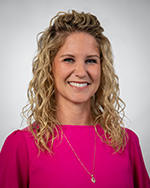Megan Holtmann
 Lecturer of Nursing
Lecturer of Nursing
Office: Nursing House
Email: maholtmann@mckendree.edu
Education
D.N.P., McKendree University (2018)
M.S.N., McKendree University (2016)
B.S.N., Saint Louis University (2009)
Teaching Interests
Ethics, nursing foundations, anything that can help students advance their knowledge
in the nursing field.
Publications
Schulz, G., Kelly, K., Holtmann, M. & Armer, J. "Navigating decisional conflict as
a family when facing the decision of stem cell transplant for a child or adolescent
with sickle cell disease." Patient Education and Counseling, 104. 2020
Schulz, G., Foster, R., Lang, V., Towerman, A., Shenoy, S., Lauer, B., Burleson, E.,
& Holtmann, M. "Early identification of barriers and facilitators to self-management
behaviors in pediatric patients with sickle cell disease to minimize hematopoietic
cell transplantation complications." Journal of Pediatric Oncology Nursing, 35. (2018)
Schulz, G., Kelly, K., Holtmann, M., Doering, M., & Armer, J. "Decision making in
pediatric hematopoietic cell transplantation: Influential factors vary among diseases."
Pediatric Blood & Cancer, 65. (2017)
Schulz, G., Foster, R., Kennedy, V., Towerman, A., & Holtmann, M. "Modifying psychosocial barriers to minimize stem cell transplant complications in pediatric patients with sickle cell disease: A case study approach." Biology of Blood and Marrow Transplantation, 23. (2017)
Taylor, H., Shenoy, S., Balakas, K., Brandt, J., Hente, M., Holtmann, M., Ratner,
M., Ulmer, T., Westfall, A., & Ecrole, P. "Effect of increased activity on deconditioning
in pediatric stem cell transplant: A feasibility study." Biology of Blood and Marrow Transplantation, 23. (2017)
Schulz, G., Holtmann, M., Tucker, A., & Balakas, K. "Production, implementation, and
utilization of a multidisciplinary assessment for those undergoing hematopoietic cell
transplantation." Biology of Blood and Marrow Transplantation, 21. (2015)
Teaching Philosophy
I always enjoy an uplifting quote, and this statement is no different: "By learning
you will teach; by teaching you will learn" (Latin proverb). In my career, I have
been both a teacher and learner numerous times. While I was in the hospital industry,
I was the one with the post-transplant care and information; however, I was also the
one learning about the hardships families encounter, along with heartache, joy, and
hope. When I moved into academia, I saw the same drive, heartache, joy, and hope in
my students as they continued their journey through their nursing education.
I believe honesty with students regarding expectations, mistakes, and successes all
contribute to the respect between the two parties. Having these guidelines upfront
already gives me an idea of what additional resources or help certain students will
need as they continue with my course. This also helps in clinical, to create a safe
learning environment for the students when caring for patients (and/or within the
simulation lab). I am very pro-exploration into a situation and talking through and
taking (safe) chances. We can use this model to find and correct mistakes quickly
and guide students on the reasonings behind the error. With this thought, students
are more comfortable in the class and clinical settings, as well as feel more open
to coming to me with any questions or concerns.
I enjoy challenging my students, asking them questions, probing and driving into what
they know, and pushing them to think about concepts that may not be at the forefront
of their thought processes. I encourage them to work through and find answers by building
on their previous knowledge. This approach truly empowers students to be accountable
to know the information and take charge of their own learning by discovering they
do have the tools to solve more complex, intense problems.
Organizations
Sigma Theta Tau
Phi Theta Kappa
